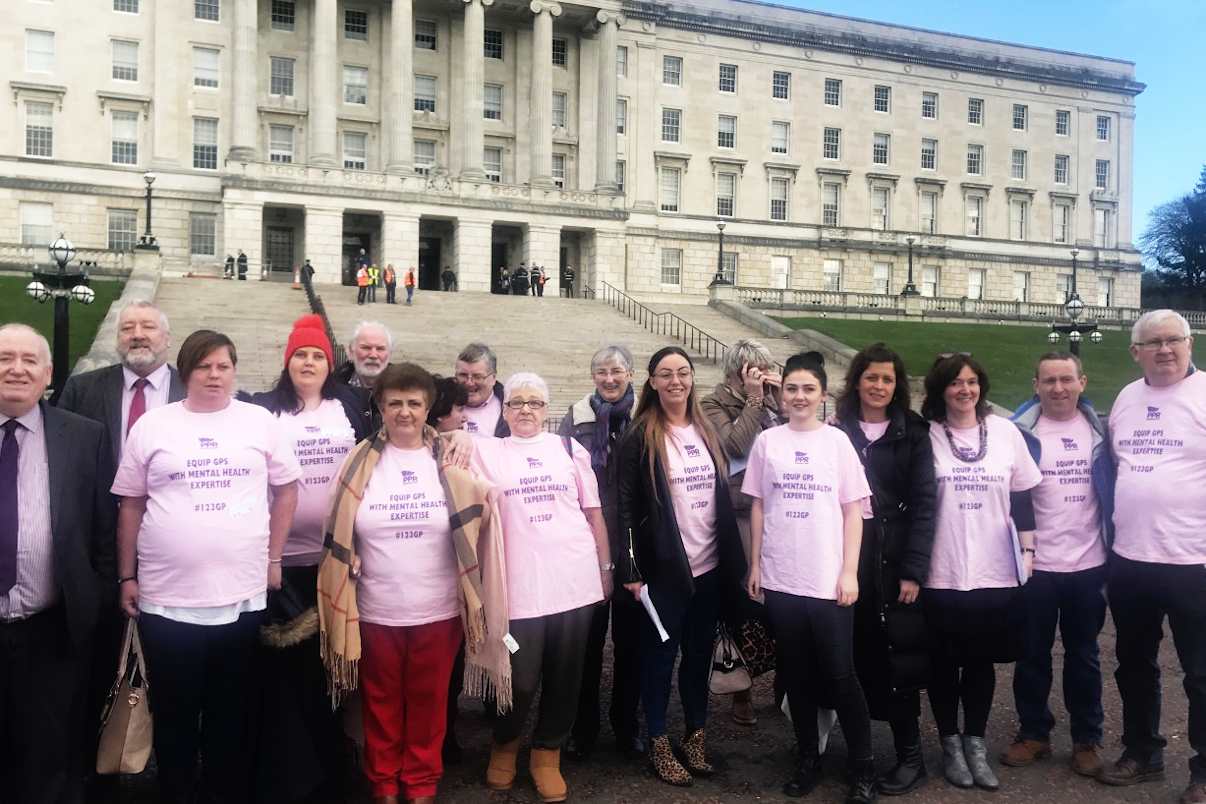#123GP Campaigners Welcome Support from the All-Party Group on Mental Health
The All-Party Group has committed to developing a consensus statement on access to counselling and #123GP campaigners look forward to working with MLAs to take this forward.
MLAs on the All-Party Group were briefed this week on the ‘postcode lottery’ nature of access to mental health counselling, and on the solutions that are within easy reach, by #123GP campaigner Kirsty Scott and Sara Boyce, a PPR Organiser.
Kirsty Scott, an #123GP campaigner, gave a compelling account of her own experiences of accessing counselling support following the tragic deaths of both her 19-year-old son and her husband within a period of 18 months.
Kirsty explained how her local GP practice was unable to provide counselling and how she had to travel some distance by public transport to access counselling in a GP practice in another town.
She told MLAs how her experience of counselling had been an incredibly positive one:
“I can say that as a hardened campaigner for mental health services and a service user, this has changed my life – having somebody there I can talk to, it gives me hope. It also gives me the choice of taking this option and that’s what people are asking for – options”.
Kirsty also highlighted how the pandemic had opened up options for accessing counselling via online platforms. She noted that while initially she herself had been sceptical of how telephone provision might work, she has since moved to video appointments and has found them to be extremely helpful.
She acknowledged that this type of provision mightn’t work for everyone but that it could help overcome barriers in relation to transport and physical space within GP practices.
PPR organiser, Sara Boyce, then provided MLAs with an analysis, based on a sustained 3-year campaign by #123GP activists, of the current situation in relation to access to counselling via GP practices, the key barriers that exist and simple achievable solutions.
Key points included
- The #123GP campaign has used official data to create an interactive map that shows clearly that a post-code lottery is in operation in respect of GP-practice-based counselling.
- Overall, 69% of GP practices offer this service. However, the rate of provision varies significantly between Trusts, from 89% of all practices in the Northern Trust to only 51% of practices in the Southern Trust.
- Disparities between Assembly constituencies are even more marked. In East Antrim 100% of GP practices have an in-house counsellor; in sharp contrast to only 40% of practices in West Tyrone.
- Other barriers to access include waiting times, the lack of a waiting-time target, a cap of six sessions and inadequate funding.
- Primary Care Talking Therapy Hubs, established in 2015 in all five Trusts by the Health and Social Care Board, were intended as an alternative to GP practice- counselling.Despite this, the Department of Health acknowledges that services are unavailable to a significant proportion of the population.
- The barriers to accessing counselling via Talking Therapy Hubs are similar to those encountered by people seeking to access counselling through their GP practice: a lack of geographical coverage, no target waiting time, a cap of six sessions, poor budgetary planning and limited evaluation.
The full briefing paper is available here.
#123GP campaigners are calling on the Minister for Health, Robin Swann, to include the following commitments in the 10-year Mental Health strategy, to ensure that everybody who needs access to counselling can access it easily and quickly.
- Ensure that all GP practices are adequately resourced to provide timely access to counselling for everyone who needs it.
- Ensure that nobody waits longer than 28 days for a routine appointment and no longer than 2 days for an urgent one.
- Provide people with options for accessing counselling – in their local GP practice or through the Talking Therapy Hubs run by the Trusts.